2020-2021学年牛津译林版英语八年级下册 Unit 5 Good manners. reading课件(共24张PPT)
文档属性
| 名称 | 2020-2021学年牛津译林版英语八年级下册 Unit 5 Good manners. reading课件(共24张PPT) |
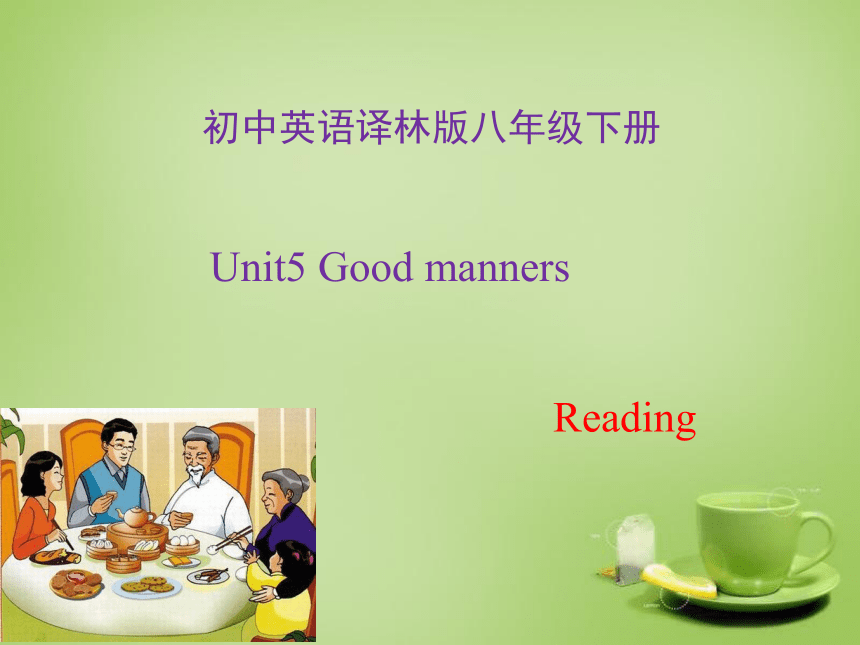
|
|
| 格式 | pptx | ||
| 文件大小 | 2.9MB | ||
| 资源类型 | 教案 | ||
| 版本资源 | 牛津译林版 | ||
| 科目 | 英语 | ||
| 更新时间 | 2021-04-21 00:00:00 | ||
图片预览

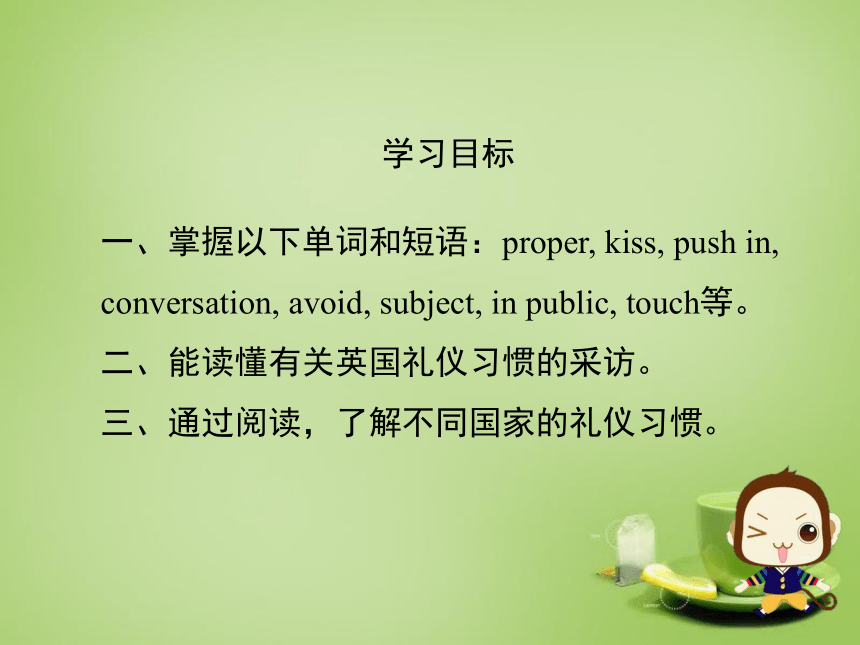
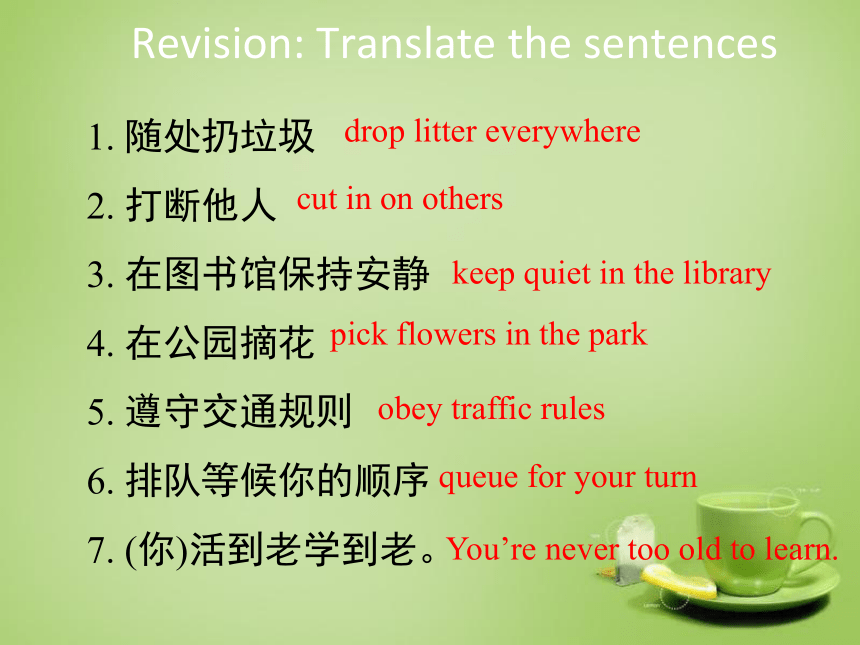

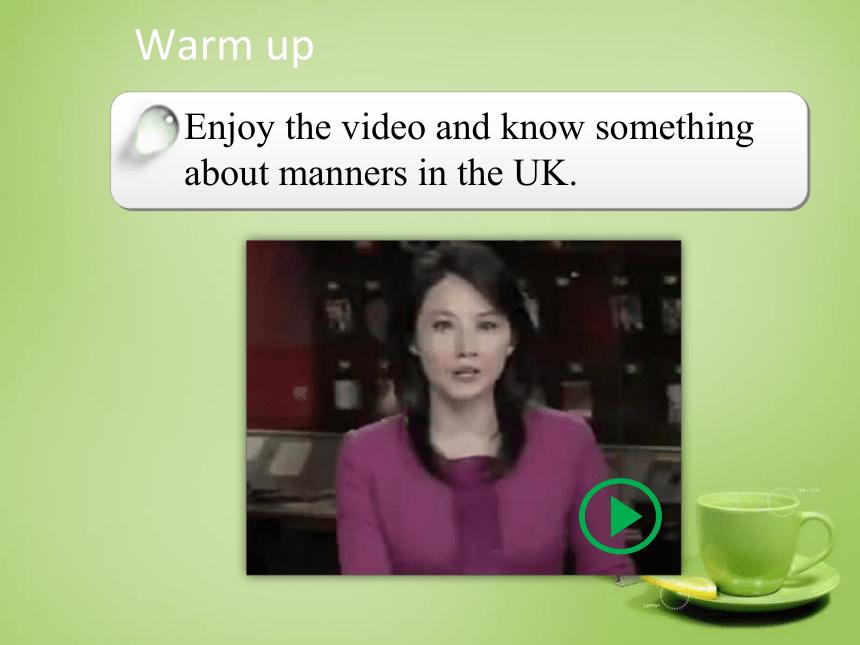
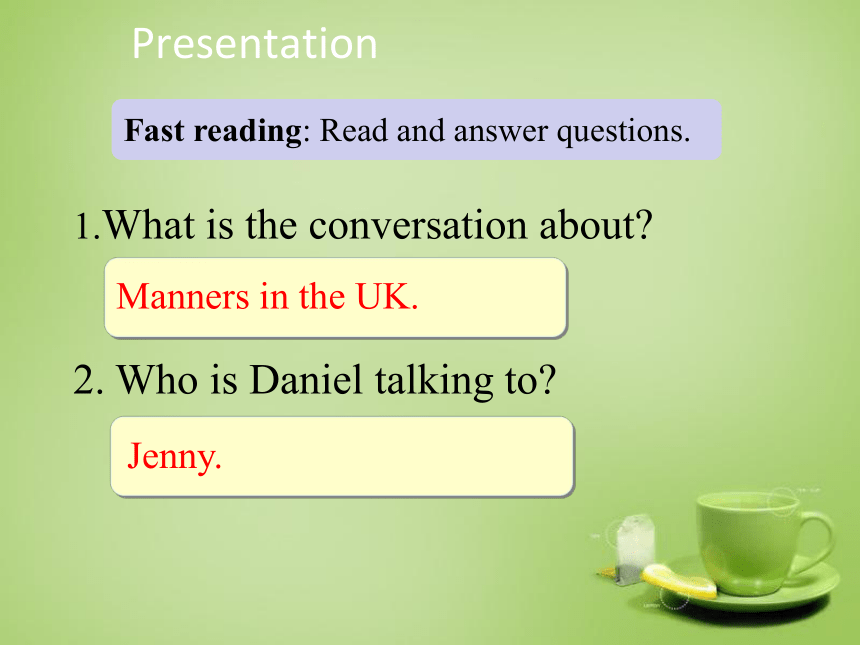
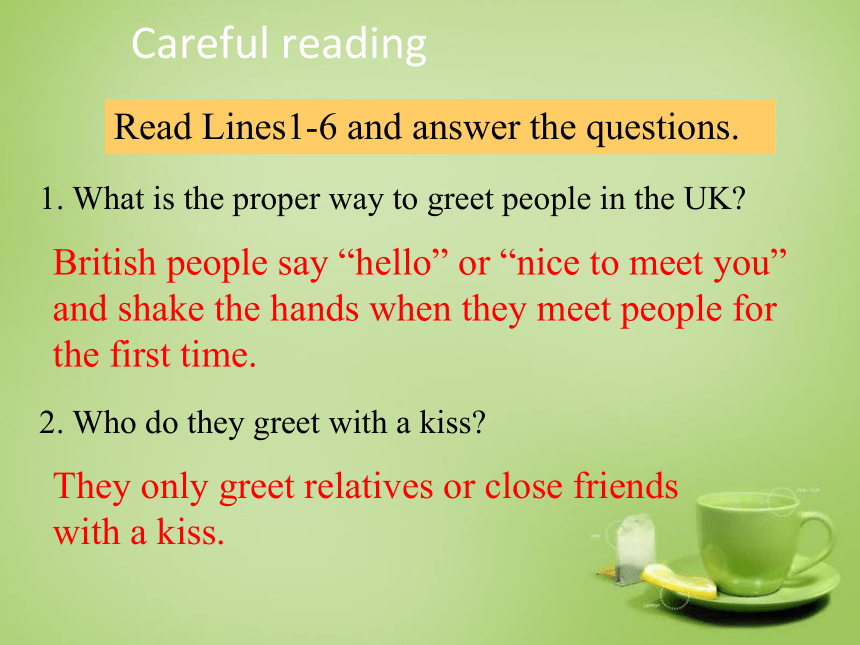
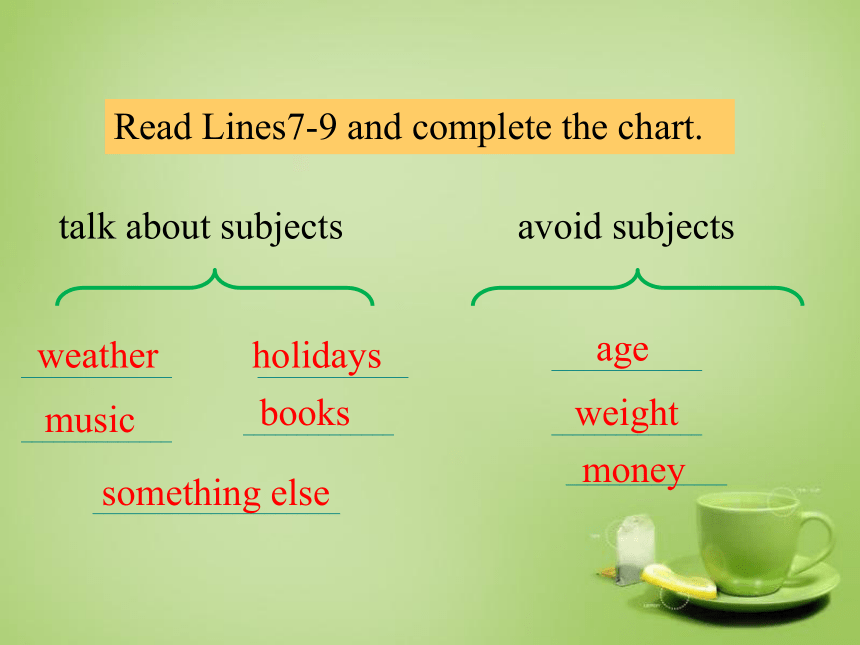
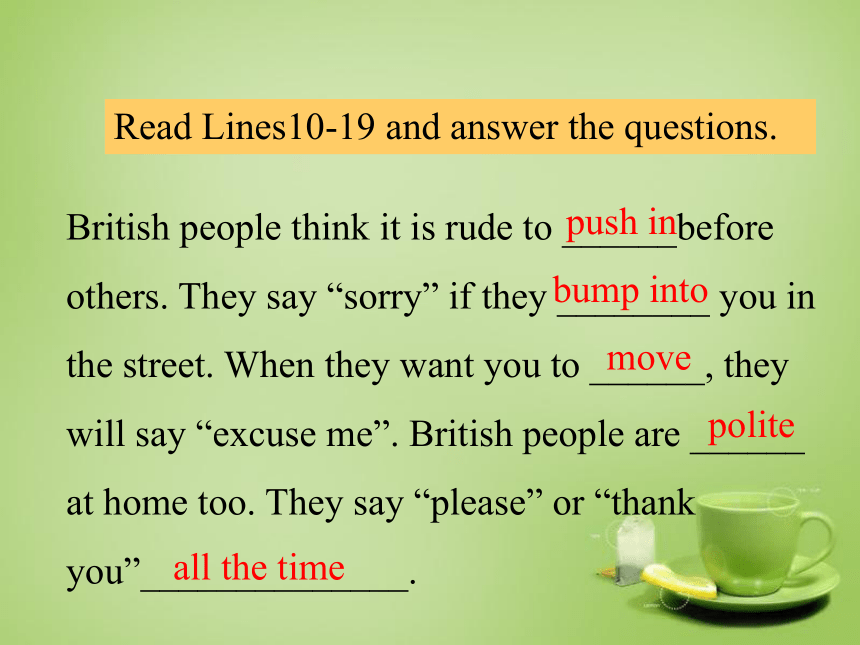
文档简介
Unit5 Good manners
初中英语译林版八年级下册
Reading
学习目标
一、掌握以下单词和短语:proper, kiss, push in, conversation, avoid, subject, in public, touch等。
二、能读懂有关英国礼仪习惯的采访。
三、通过阅读,了解不同国家的礼仪习惯。
Revision: Translate the sentences
1. 随处扔垃圾
2. 打断他人
3. 在图书馆保持安静
4. 在公园摘花
5. 遵守交通规则
6. 排队等候你的顺序
7. (你)活到老学到老。
drop litter everywhere
cut in on others
keep quiet in the library
pick flowers in the park
obey traffic rules
queue for your turn
You’re never too old to learn.
Lead in
Do you know the saying
“When in Rome, do as the Romans do”?
Rome
Warm up
Enjoy the video and know something about manners in the UK.
Presentation
Fast reading: Read and answer questions.
1.What is the conversation about?
2. Who is Daniel talking to?
Manners in the UK.
Jenny.
Careful reading
Read Lines1-6 and answer the questions.
1. What is the proper way to greet people in the UK?
2. Who do they greet with a kiss?
British people say “hello” or “nice to meet you” and shake the hands when they meet people for the first time.
They only greet relatives or close friends with a kiss.
Read Lines7-9 and complete the chart.
talk about subjects
avoid subjects
______________
_______________________
______________
______________
______________
______________
______________
_______________
weather
holidays
music
books
something else
age
weight
money
Read Lines10-19 and answer the questions.
British people think it is rude to ______before others. They say “sorry” if they ________ you in the street. When they want you to ______, they will say “excuse me”. British people are ______ at home too. They say “please” or “thank you”______________.
push in
bump into
move
polite
all the time
Read Lines20-25, answer the questions.
Keep your voice down ________. British people don’t like to _____ or ______ loudly.
What’s the Chinese meaning of the saying “When in Rome, do as the Romans do”?
___________
in public
shout
laugh
入乡随俗
Help Simon tick for what British people do and for what they do not do.
Practice
Greeting: say “hello” or “nice to meet you”
shake hands
usually greet people with a kiss
talk about the weather, holidays, music, books
talk about age, weight or money
In public: queue for something
push in before others
say “sorry” if they bump into others
push past people
shout or laugh loudly
At home: say “please” and “thank you” all the time
Help Simon match the words on the left with the meanings on the right. Write the correct letters in the blanks.
B1
Post reading
1. proper (L2) ____
2. greet (L2) ____
3.conversation (L7) ____
4. avoid (L9) ____
5. push in (L11) ____
6. bump (L12) ____
a. a small talk
b. try not to do sth.
c. go in front of other people
who are waiting
d. hit someone or something
by accident
e. right or correct
f. say hello to someone or
welcome them
e
f
a
b
c
d
Help Jenny complete her article with the correct
words.
B3
Good manners in the UK
British people usually say “hello” or “nice to meet
you” and _______________ when they meet you
for the first time. They only greet ________ or
close friends with a kiss. They like to start a
___________ with subjects like the weather,
holidays, music or books. They _______ talking
about age, weight or money.
shake your hand
relatives
conversation
avoid
British people think it is rude to _________before
others. They always ________. They say “sorry”
if they ___________you in the street. When they
want you to _______, they say “excuse me”. They
don’t like to shout or laugh loudly ___________.
British people are _______ at home too. They say
“please” and “thank you”____________.
“When in Rome, do as ____________ do.” When
we are in a strange place, we should do as the
local people do.
push in
queue
bump into
move
in public
polite
all the time
the Romans
C Talking about manners in China
Daniel is thinking about the differences in manners between the UK and China. Work in pairs and discuss his questions below with your partner.
1. How do we greet each other?
2. How do we usually start a conversation?
3. Do we always queue?
4. What do we do if someone is in our way?
5. Do we shout or laugh loudly in public?
6. Do we say “please” and “thank you” at home?
7. Do we need to improve our manners?
We Chinese people greet each other by nodding their heads, shaking hands or a polite bow(礼貌的鞠躬).
2. We Chinese people usually start a conversation by sentences like “Did you eat?”, “Where will you go?”…
3. Sometimes we Chinese people don’t queue but push in before others.
Possible answers:
4. Some Chinese people will touch you or push past you when you’re in their way.
5. There are still impolite phenomena existing like shouting or laughing loudly in public.
6. We hardly say “please” and “thank you” at home. And take all we get for granted.
take … for granted
认为……是理所当然的
Language points
1. shake sb’s hand 与某人握手
如:Chinese people usually shake your hand to express their friendliness.
中国人通常用握手来表达友好。
2. greet sb. with… 意思是“以……方式跟人打招呼”。
3. avoid vt.避免, avoid +n./pron./sb. to do sth./v-ing。
如: You should avoid _______ such unhealthy food.
你应避免吃这些不健康的食品。
知
识
总结
eating
3. in public 公开地,在别人面前
4. It is + adj. + (for sb.) + to do sth. (对某人来说)做
某事……,句型中的it是形式主语,真正的主语是后面的to do sth. 。
如: It’s important _______________________ the telephone numbers.
对孩子们来说,记住这些电话号码很重要。
5. in one’s way 挡住某人的路
知
识
总结
for children to remember
如: I couldn't walk very fast because a lot of people got in my way.
我不能走的很快,因为很多人挡了我的路。
6. as well (as) 也,还有
如: I write my own songs and I play the guitar as well. 我唱自己谱曲的歌,也弹吉他。
【链接】as well一般不用否定句,通常放在句末,强调时可放在句中。
either用于否定句,放在句末,之前加逗号。
too多用于肯定句中,通常位于句末。
知
识
总结
Exercise
一、用下面方框中选择适当的词填空。
1. My classmates love music. I love it _________.
2. It is impolite to ________ before others.
3. We should not speak loudly ________.
4. Chinese people usually ________________ when they meet you for the first time.
5. Please don’t stand ___________. I am in a hurry.
as well in one’s way in public push in shake sb.’s hand
as well
in my way
shake your hand
in public
push in
1. 今天我们已邀请了King先生谈论美国的礼仪。
Today we _____ _______ Mr King ______ _____ _____ __________ in the USA.
2. 有时我们中国人以拥抱的方式问候亲戚或亲密的朋友。
Sometimes we Chinese _____ ___________or ______ friends ______ a hug.
3. 在这等我回来。
_____ here ___ ____ come back.
4. 如果有人挡住了路,你可以说“劳驾”。
If someone is ___ ____ _____, you can say “______ ______”.
二、翻译句子。
have invited
to talk about
manners
greet relatives close
with
Wait till I
in your way
Excuse me
Summary
some words: proper, greet, close, avoid, bump, loudly, excuse, till, push
some phrases: shake sb.’s hand, in public, in one’s way, as well (as), by accident
some sentences:
What’s the proper way to greet people there?
British people only greet relatives or close friends with a kiss.
Just as the saying goes, “When in Rome, do as the Romans do.”
Homework
1. Review the important points in this part.
2. Discuss in groups about the difference between manners in UK and manners in China.
3. Preview Grammar.
初中英语译林版八年级下册
Reading
学习目标
一、掌握以下单词和短语:proper, kiss, push in, conversation, avoid, subject, in public, touch等。
二、能读懂有关英国礼仪习惯的采访。
三、通过阅读,了解不同国家的礼仪习惯。
Revision: Translate the sentences
1. 随处扔垃圾
2. 打断他人
3. 在图书馆保持安静
4. 在公园摘花
5. 遵守交通规则
6. 排队等候你的顺序
7. (你)活到老学到老。
drop litter everywhere
cut in on others
keep quiet in the library
pick flowers in the park
obey traffic rules
queue for your turn
You’re never too old to learn.
Lead in
Do you know the saying
“When in Rome, do as the Romans do”?
Rome
Warm up
Enjoy the video and know something about manners in the UK.
Presentation
Fast reading: Read and answer questions.
1.What is the conversation about?
2. Who is Daniel talking to?
Manners in the UK.
Jenny.
Careful reading
Read Lines1-6 and answer the questions.
1. What is the proper way to greet people in the UK?
2. Who do they greet with a kiss?
British people say “hello” or “nice to meet you” and shake the hands when they meet people for the first time.
They only greet relatives or close friends with a kiss.
Read Lines7-9 and complete the chart.
talk about subjects
avoid subjects
______________
_______________________
______________
______________
______________
______________
______________
_______________
weather
holidays
music
books
something else
age
weight
money
Read Lines10-19 and answer the questions.
British people think it is rude to ______before others. They say “sorry” if they ________ you in the street. When they want you to ______, they will say “excuse me”. British people are ______ at home too. They say “please” or “thank you”______________.
push in
bump into
move
polite
all the time
Read Lines20-25, answer the questions.
Keep your voice down ________. British people don’t like to _____ or ______ loudly.
What’s the Chinese meaning of the saying “When in Rome, do as the Romans do”?
___________
in public
shout
laugh
入乡随俗
Help Simon tick for what British people do and for what they do not do.
Practice
Greeting: say “hello” or “nice to meet you”
shake hands
usually greet people with a kiss
talk about the weather, holidays, music, books
talk about age, weight or money
In public: queue for something
push in before others
say “sorry” if they bump into others
push past people
shout or laugh loudly
At home: say “please” and “thank you” all the time
Help Simon match the words on the left with the meanings on the right. Write the correct letters in the blanks.
B1
Post reading
1. proper (L2) ____
2. greet (L2) ____
3.conversation (L7) ____
4. avoid (L9) ____
5. push in (L11) ____
6. bump (L12) ____
a. a small talk
b. try not to do sth.
c. go in front of other people
who are waiting
d. hit someone or something
by accident
e. right or correct
f. say hello to someone or
welcome them
e
f
a
b
c
d
Help Jenny complete her article with the correct
words.
B3
Good manners in the UK
British people usually say “hello” or “nice to meet
you” and _______________ when they meet you
for the first time. They only greet ________ or
close friends with a kiss. They like to start a
___________ with subjects like the weather,
holidays, music or books. They _______ talking
about age, weight or money.
shake your hand
relatives
conversation
avoid
British people think it is rude to _________before
others. They always ________. They say “sorry”
if they ___________you in the street. When they
want you to _______, they say “excuse me”. They
don’t like to shout or laugh loudly ___________.
British people are _______ at home too. They say
“please” and “thank you”____________.
“When in Rome, do as ____________ do.” When
we are in a strange place, we should do as the
local people do.
push in
queue
bump into
move
in public
polite
all the time
the Romans
C Talking about manners in China
Daniel is thinking about the differences in manners between the UK and China. Work in pairs and discuss his questions below with your partner.
1. How do we greet each other?
2. How do we usually start a conversation?
3. Do we always queue?
4. What do we do if someone is in our way?
5. Do we shout or laugh loudly in public?
6. Do we say “please” and “thank you” at home?
7. Do we need to improve our manners?
We Chinese people greet each other by nodding their heads, shaking hands or a polite bow(礼貌的鞠躬).
2. We Chinese people usually start a conversation by sentences like “Did you eat?”, “Where will you go?”…
3. Sometimes we Chinese people don’t queue but push in before others.
Possible answers:
4. Some Chinese people will touch you or push past you when you’re in their way.
5. There are still impolite phenomena existing like shouting or laughing loudly in public.
6. We hardly say “please” and “thank you” at home. And take all we get for granted.
take … for granted
认为……是理所当然的
Language points
1. shake sb’s hand 与某人握手
如:Chinese people usually shake your hand to express their friendliness.
中国人通常用握手来表达友好。
2. greet sb. with… 意思是“以……方式跟人打招呼”。
3. avoid vt.避免, avoid +n./pron./sb. to do sth./v-ing。
如: You should avoid _______ such unhealthy food.
你应避免吃这些不健康的食品。
知
识
总结
eating
3. in public 公开地,在别人面前
4. It is + adj. + (for sb.) + to do sth. (对某人来说)做
某事……,句型中的it是形式主语,真正的主语是后面的to do sth. 。
如: It’s important _______________________ the telephone numbers.
对孩子们来说,记住这些电话号码很重要。
5. in one’s way 挡住某人的路
知
识
总结
for children to remember
如: I couldn't walk very fast because a lot of people got in my way.
我不能走的很快,因为很多人挡了我的路。
6. as well (as) 也,还有
如: I write my own songs and I play the guitar as well. 我唱自己谱曲的歌,也弹吉他。
【链接】as well一般不用否定句,通常放在句末,强调时可放在句中。
either用于否定句,放在句末,之前加逗号。
too多用于肯定句中,通常位于句末。
知
识
总结
Exercise
一、用下面方框中选择适当的词填空。
1. My classmates love music. I love it _________.
2. It is impolite to ________ before others.
3. We should not speak loudly ________.
4. Chinese people usually ________________ when they meet you for the first time.
5. Please don’t stand ___________. I am in a hurry.
as well in one’s way in public push in shake sb.’s hand
as well
in my way
shake your hand
in public
push in
1. 今天我们已邀请了King先生谈论美国的礼仪。
Today we _____ _______ Mr King ______ _____ _____ __________ in the USA.
2. 有时我们中国人以拥抱的方式问候亲戚或亲密的朋友。
Sometimes we Chinese _____ ___________or ______ friends ______ a hug.
3. 在这等我回来。
_____ here ___ ____ come back.
4. 如果有人挡住了路,你可以说“劳驾”。
If someone is ___ ____ _____, you can say “______ ______”.
二、翻译句子。
have invited
to talk about
manners
greet relatives close
with
Wait till I
in your way
Excuse me
Summary
some words: proper, greet, close, avoid, bump, loudly, excuse, till, push
some phrases: shake sb.’s hand, in public, in one’s way, as well (as), by accident
some sentences:
What’s the proper way to greet people there?
British people only greet relatives or close friends with a kiss.
Just as the saying goes, “When in Rome, do as the Romans do.”
Homework
1. Review the important points in this part.
2. Discuss in groups about the difference between manners in UK and manners in China.
3. Preview Grammar.
